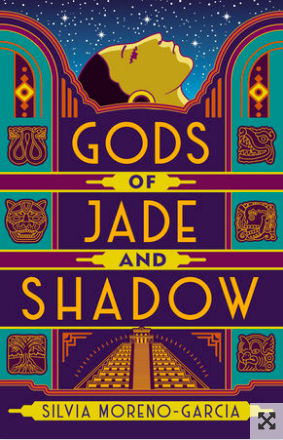Theodore McCombs on “The Substance of My Lives, the Accidents of Our Births” by José Pablo Iriarte
Iriarte’s hero, Jamie, is a nonbinary, genderqueer teenager with a secret: they remember their past lives—“not in detail, but like a book I read once and have a few hazy recollections about.” That sort of perspective helps Jamie deal with bigoted bullies that dog them back to the trailer park, but it catches them off guard when their new ex-con neighbor, Benjamin, is someone they knew from their life one previous. And from what Jamie can discover, Benjamin might have murdered them.
The conceit is lively enough: it’s the intellectual fun of a cozy detective story, with the uncanny echo of a vengeful ghost story, all grounded in an engaging young adult hero. But it’s Jamie’s gender identity, and their refusal to live falsely even in the face of isolation and prejudice, that’s the story’s heart. Iriarte (who is also nonbinary) gives Jamie the courage and self-knowledge we wished we had at that age, and ties their gender identity into their metempsychoses cleverly. “In over a dozen lifetimes I can recall, I’ve been male and female enough times for those words to mean little more to me than a particular shirt—not who I am.” It’s an important representation of an identity that many readers may find unfamiliar, wonderfully un-tragic, and warmly honest.
C. S. Peterson read: “The Only Harmless Great Thing” by Brooke Bolander
Three great injustices wind around each other like braided strands under Bolander’s deft and lyrical hand. This alternative history is a tale to break your heart. The hope it leaves you with is faint and slim. It may not be a hope for humans, but hope for those that survive them and come after.
The first strand is the true story of the Radium Girls, young women, as young as fourteen, who painted glowing radium on the dials and clock faces for U.S. Radium Corp. in the 1920s and 1930s. They used fine camel-hair brushes that they would sharpen to a point by dampening them with their lips between dips into the radium laced paint. One girl, recently exhumed, still glows in her coffin. The second strand, another American tragedy, was the electrocution of Topsy the elephant at Coney Island. The third, projected a little into the future, is the dilemma of where to store all the nuclear waste we’re creating, which has a radioactive half-life of two million years. Combine that timescale with our proclivity for self-destruction, and it’s possible that humans will be gone long before we can clean up the mess we’ve made.
Bolander’s story imagines a not-too-distant future in which humans have finally decided where to store the nuclear waste. The next problem to solve: how to warn future generations not to go near it? Humans memories are so brief, and the consequences of their disastrous mistakes last so long. Enter a species famed for its long memory: elephants. In the alternate history of Bolander’s creation, dying radium girls taught retired circus elephants to paint with radium. Their bigger bodies could take more radiation before giving out. In the present action, the disaster with Topsy and the dying radium girl is long in the past. Disney had even made a cartoon, repainting deep and complex history of injustice as a romanticized moral tale.
“No matter what you did, forty or fifty or a hundred years passed and everything became a narrative to be toyed with, masters of media alchemy splitting the truth’s nucleus into a ricocheting cascade reaction of diverging alternate realities.”
Since humans the world over associate glowing elephants with the dangers of radiation, a group of scientists offer a proposal to the elephant nations. They will splice the genes of luminescent jellyfish with those of the surviving elephants and the land where the waste is stored will be theirs forever. Their glowing bodies will be a sign of danger to those that may come after.
The beauty of Bolander’s piece is in the voices. The elephants speak in metaphors built from the sensibilities of their experience. Mother elephants tell their stories to a mooncalf in phrases languid and ponderous. They pass down wisdom mother to daughter, gathered from deep in time. They relate legends back to the ice age, telling of the fur-mother, who sacrificed herself to rescue the first stories from a terrible bull.
“Without stories there is no past, no future, no We. There is Death. There is Nothing, a night without moon or stars.”
The voice of the radium girl is from West Virginia. Painting radium on watch faces seemed a much better life than mining coal. Management assured her it was safe. She recruited her friends to join as well. Now they are dead or dying and their lives rest heavily upon her. She knows she is dying as well. She is determined to make her life and death count for something, as she stands up to the management men and other powers that be.
The third voice is Kat, a scientist sent to negotiate with the elephant’s representative. It is a diplomatic mission for which she is ill prepared, withering under the gaze of the elephant matriarch and even the translator. She is the first human in the story with any integrity who has a tiny cachet of power that she can put behind her desire to do the right thing. Or as right a thing as can be done. Because what the Mothers tell the elephant child is true:
“No matter how far you march, O best beloved mooncalf, the past will always drag around your ankle, a snapped shackle time cannot pry loose.”
Danyelle C. Overbo on “The Last Banquet of Temporal Confections” by Tina Connolly
I’ll just come out and say it: I loved this novelette. Connolly’s quick and curious story about a baker’s wife who becomes a taster to the Traitor King is the exact kind of fantasy that got me into fantasy in the first place. The world, similar enough to our own but with a touch a of magic, is perfectly built. The bad guy of the story: so very bad. The protagonist: the kind of girl you root for. The romance is swoon-worthy. All of this is packaged in a new and fun way. There is magic in an herb the baker has distilled and modified to invoke vivid memories in those who eat his pastries. He’s been kidnapped by the usurper of the throne to create elaborate banquets with his magic herb.
The protagonist of the tale, Saffron, is separated from her husband, and only gets memories (and possibly messages?) from him through his work. The memory pastries can do different things depending on the pastry, and it allows for backstory to be used in an intriguing way throughout the piece. Connolly does a good job of using this mechanism to move the plot forward without it being too confusing for the reader. You also get a surprisingly complete glimpse into Saffron’s past and her relationship with her husband and her sister. The side characters are also well drawn and fully realized. Again, quite a feat for a shorter piece that takes place during the course of one eventful dinner. The ending is as scrumptious as all the temporal confections Connolly describes, which is saying a lot.
C. H. Lips read: “The Rule of Three” by Lawrence M. Schoen
An alien has landed its pearl-like spaceship in the river beside a remote Miao village where our narrator’s grandmother lives. The unnamed narrator, who is half-Chinese, half-American and living in Washington D. C., catches the next plane to China. There he meets Foom, the alien who has chosen this remote mountain village precisely because it has no technology, no electricity, no running water. The Miao people live within the philosophy of Foom’s Rule of Three:
“If I make a thing, I am one and the thing is full of the life that I gave it. If I pass that thing to you, you are two, and the thing still feels its connection to me and so retains that life. If you give the thing to another, that person is three. The thing still holds the link to me, my life still resonates within it. The distance does not matter, but the number does. Three is the limit. Pass the thing I made on to a fourth person and it can no longer detect me. The connection is broken. Unlife rushes in to fill the void. As a result it cannot be easily perceived. It is dark, inert.”
Foom and the narrator agree to touch hands and meld minds so they can learn from each other. Foom is especially interested in finding people doing art which is in line with the Rule of Three. My favorite part of this story is when the narrator’s grandmother teaches Foom the art of batik—a method of using wax and dye to create intricate designs on cloth.
In return Foom teaches the narrator how to alter his own sweat to create small pearls that, with practice, get bigger and bigger, and float as the alien’s ship does. Foom says that within a year the narrator could create his own spaceship.
But never trust a friendly alien! Things turn sour when Foom confesses that its kind isn’t pleased that humans have been spreading unlife into the solar system. Our narrator finds himself an unwilling accomplice in Foom’s plan for human species extinction, and he must find a way to use the new skills Foom taught him to save humanity.
C. S. Peterson on “An Agent of Utopia” by Andy Duncan
Duncan dives deep into an alternative history of Renaissance conflict. Thomas More sits in prison awaiting execution for refusing to recognize King Henry VIII as the head of the Church of England. Aliquo, our narrator, is coming to visit with an offer of escape, though before Aliquo can enter the prison they are struck, in flowery detail, by the beauty of More’s daughter, who is just exiting, and in tears.
Aliquo is from Utopia, the perfect island sprung from More’s own mind. More declines rescue, and then the fun begins, as Duncan plays, in gruesome detail, with the idea of the voice in the mind. More’s works live on after him; indeed, even during More’s life it seems the idea of Utopia that sprang from his living brain has taken on a life of its own. If one reads More’s work now, isn’t his voice in one’s head? And once there, does it ever leave?
There’s plenty of swash and buckle in this novelette, a sprinkling of farce with multiple heads on pikes and carried about in sacks, a dash of surprise twist at the end, and the possibility that More’s Utopia might not be all that it’s cracked up to be when seen through other’s eyes. Once Aliquo’s voice is in your head, they may never leave!































Cadwell Turnbull's new novel — the first in a trilogy — imagines the hard, uncertain work of a fantastical justice.